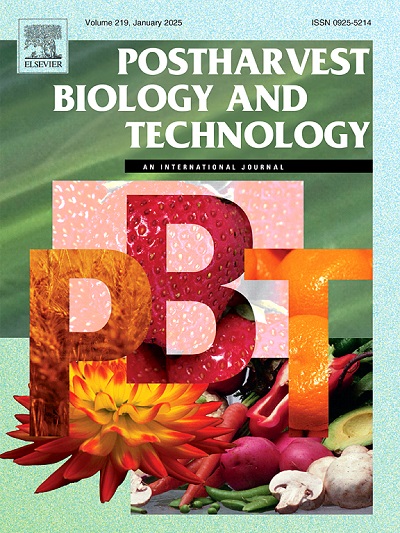Phenyllactic acid inhibits softening, lignification and quality deterioration of postharvest pea sprouts
IF 6.8
1区 农林科学
Q1 AGRONOMY
引用次数: 0
Abstract
Pea sprouts are prone to softening and lignification after harvest. This study investigated the effects of phenyllactic acid (PLA) treatment (0 and 4 mM) on quality maintenance of pea sprouts stored at 10 ℃ for 12 days. PLA treatment effectively mitigated quality deterioration during storage by maintaining higher sensory quality, vitamin C and soluble protein content, and volatile compounds, and reducing weight loss by 15 % compared to control at 12 d. Textural properties were preserved, with gumminess and chewiness remaining at 284.45 and 36.07, whereas the control rose to 336.40 and 53.74 at 12 d. Paraffin-section observations revealed that PLA markedly restrained cell-wall disassembly, as evidenced by elevated cellulose and hemicellulose contents concomitant with suppressed cellulase and β-galactosidase (β-Gal) activities. Moreover, Lignification was restrained, as indicated by diminished lignin autofluorescence and lignin content, together with decreased phenylalanine ammonia-lyase (PAL) and cinnamyl alcohol dehydrogenase (CAD) activities and down-regulated expression of lignin biosynthesis genes. Additionally, PLA treatment enhanced the non-enzymatic antioxidant system (total polyphenols and flavonoids content, 2, 2-diphenyl-1-picrylhydrazyl (DPPH) and 2, 2’-azino-bis (3-ethylbenzothiazoline-6-sulfonic acid) (ABTS) radical scavenging capacity), thereby reducing hydrogen peroxide (H2O2) and malondialdehyde (MDA) accumulation. Collectively, PLA treatment could be a potential strategy to preserve the storage quality of sprouts, particularly in inhibiting lignification.
苯乳酸抑制采后豌豆芽的软化、木质化和品质劣化
豌豆芽在收获后容易软化和木质化。研究了苯乳酸(PLA)处理(0和4 mM)对10℃贮存12 d豌豆芽品质维持的影响。PLA处理有效地缓解了贮藏过程中的品质恶化,保持了较高的感官品质、维生素C、可溶性蛋白含量和挥发性化合物,与对照组相比,12 d时的质量损失减少了15% %。质地性能得到了保留,胶性和咀嚼性保持在284.45和36.07,而对照组在12 d时分别上升到336.40和53.74。石蜡切片观察显示PLA显著抑制了细胞壁的分解。纤维素和半纤维素含量升高,纤维素酶和β-半乳糖苷酶(β-Gal)活性受到抑制。此外,木质素自身荧光和木质素含量降低,苯丙氨酸解氨酶(PAL)和肉桂醇脱氢酶(CAD)活性降低,木质素生物合成基因表达下调,木质素作用受到抑制。此外,PLA处理增强了非酶促抗氧化系统(总多酚和类黄酮含量,2,2 -二苯基-1-吡啶肼(DPPH)和2,2 ' -氮基-双(3-乙基苯并噻唑-6-磺酸)(ABTS)自由基清除能力),从而减少过氧化氢(H2O2)和丙二醛(MDA)的积累。总之,聚乳酸处理可能是一种潜在的策略,以保持芽的储存质量,特别是在抑制木质素化。
本文章由计算机程序翻译,如有差异,请以英文原文为准。
求助全文
约1分钟内获得全文
求助全文
来源期刊

Postharvest Biology and Technology
农林科学-农艺学
CiteScore
12.00
自引率
11.40%
发文量
309
审稿时长
38 days
期刊介绍:
The journal is devoted exclusively to the publication of original papers, review articles and frontiers articles on biological and technological postharvest research. This includes the areas of postharvest storage, treatments and underpinning mechanisms, quality evaluation, packaging, handling and distribution of fresh horticultural crops including fruit, vegetables, flowers and nuts, but excluding grains, seeds and forages.
Papers reporting novel insights from fundamental and interdisciplinary research will be particularly encouraged. These disciplines include systems biology, bioinformatics, entomology, plant physiology, plant pathology, (bio)chemistry, engineering, modelling, and technologies for nondestructive testing.
Manuscripts on fresh food crops that will be further processed after postharvest storage, or on food processes beyond refrigeration, packaging and minimal processing will not be considered.
 求助内容:
求助内容: 应助结果提醒方式:
应助结果提醒方式:


